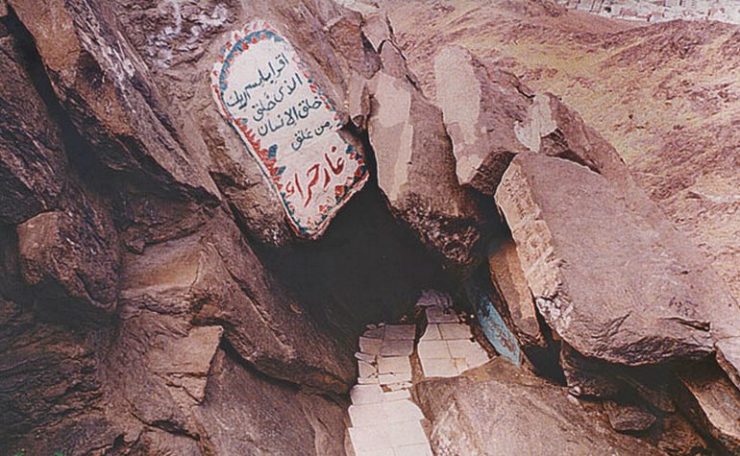
The story of divine revelation in the Islamic faith begins with the image of the tale of the Prophet Muḥammad at the cave of Hīra and the representative of the divine Revelation Jibrā’īl. It is a historically famous story which narrates the dialogue between the Prophet Muḥammad and Jibrā’īl. It stresses that the first word that Jibrā’īl said to the Prophet Muḥammad was “Read!” His reply was: “But what shall I read?” This tale, as a religious ideology, influenced the development of the Nation’s mentality and left an interesting mark on its history.
LOOKING CAREFULLY at the constant presence of this tale in Arab society, we can restrict its repercussions or impact to two arenas: the first arena is that the Islamic nation was often termed The Nation of ‘Read’. We also find today that when the nation’s critics or intellectuals decry the level of general ignorance or the low level of reading amongst the youth, they constantly repeat the phrase “the Nation of ‘Read’ isn’t reading”, on the grounds that Islamic religious thought, deep down, promotes the act of reading and encourages science, so that in this sense it is a religion that contains within itself the secrets of its strength and renewal.
But if we take into consideration the dimensions of the story from another perspective, that is from the perspective of religion and particularly that the Islamic nation is a religious nation whose religious thought is reflected in its daily life as it is lived (to the point that it enters into all the tiniest details of life). So if we put aside the metaphysical issues we can, in a realist, material sense, pose the following question: why did the divine Revelation not say “Ask!” instead of “Read!”? If it had said “Ask!” instead of “Read!” what difference would that have made? What would be the state of the Islamic nation today if it had become a Nation of ‘Ask’ instead of a Nation of ‘Read’?
Before fully answering this question one has to go back to the time of the Prophet Muḥammad and imagine how he dealt with religion and religious thinking. There is no doubt that Muḥammad as a religious man, or one who had a religious mentality, knew or was perfectly aware of the short-sighted dimension of what the idea of exalting ‘Read’ meant for the mind of the new believers. For these it doubtless meant submission – that is, take the thought without questioning it. In other words, take it without voicing an objection to the religious stories contained in the nascent Islamic religious thought, as some fait accompli that brooks no discussion about it, whereby it is forbidden to use the question word that indicates doubt: “why”?
This issue sums up the death of the mind, a mind which can only function by submission
If we want to see how this thinking manifests itself in the nation of Islam today, we see that when a student of Sharīʻa, or in fact even an ordinary person, wants to study religion, he becomes indoctrinated in the faith at the hands of his elders, and absorbs from them the religious knowledge of the ‘unseen’ exclusively and without question. Yet, at the same time, if I asked him to do the same thing, that is: to accept everything contained in another religion, at the hands of an elder from another sect or another religion, he refuses point blank!
This issue of dealing with religious thought, in short, sums up the death of the mind, a mind which can only function by submission, without asking questions about the nature of existence and the issues it raises. It reflects a clear axiom in the religion, which is to put aside the intellect when it comes to matters of faith and avoid applying approaches based on logic or objectivity when it comes to the stories contained in the religious text.
To make things clearer on the significance of question and answer in culture, we need to employ abstraction. Asking a question always indicates, in one way or another, the existence of a problem or an investigation about a subject that is shrouded in mystery. However, the answer given oten turns out to be a kind of ‘clarification’, or a ‘verdict’ on the matter at hand.
Accordingly, failure to persist in asking further questions and searching for answers means, in one way or another, the death of the mind. We thus see that the culture of ‘not asking questions’ can only impact negatively on society, causing intellectual stagnation and resulting in the lack of any scientific or philosophical progress. And with regard to philosophy, which in all ages has been the engine of thought, we see that most philosophers and philosophical theories have only been able to flourish under a clear condition: the condition of intellectual freedom. It is this which has allowed the freedom to question and to think, a freedom embodied exclusively in the capacity to raise doubts concerning those things hitherto considered axiomatic. This process is far removed from religiosity and a priori ideological thought, in other words it is a process that arose within communities that were not ruled by things ‘unseen’ revealed from heaven, untouchable and indisputable.
Asking questions about existence and attempting to explain it was at all times, and still is, the engine of thought. It produced philosophy and science, and the characteristics of advanced nations. As for the Arab nation, asking questions about reality and society is something that does not exist, and so we see our societal problems remaining unresolved. Whenever a problem emerges, there must be a pause to stop, define and ask questions as to its nature; this will lead to identifying the points at issue and the possibilities of their being corrected.
The Arab citizen is not used to, nor is permitted, to ask questions or receive answers freely.
But in our societies the opposite occurs. The issue is not approached via the intellect, and one is not permitted to analyze it via ideas that contradict the intellectual roots of the faith. On top of all that, the faith actively increases backwardness and collapse, by addressing problems or proposing solutions via religious texts written thousands of years ago and which, naturally, are no longer valid in today’s world.
Today, due to the lack of activating the mind and the fear of asking questions, the citizen has forgotten the nature of his existence and primarily his thought. Thus you find him mired in a state of stagnation, one where he has relinquished his rights and obligations. This is reflected in the shape that the political systems have taken, whereby the citizen fulfils his obligations towards the state without seeking his rights or laws that are his right.
Above all, the cultural and political systems in his societies have contributed to making matters worse, since the Arab citizen is not used to, nor is permitted, to ask questions or receive answers freely. There are only two exceptions to this, under which he lives in a state of psychological pressure: the first is when he has to undergo an exam, and the second is when he finds himself under investigation. Accordingly you always see that this citizen does not like questions, and when you press him on a certain subject, you will see him either fearful or complaining, often answering you with the famous sentence: “Why are you interrogating me?” The culture of asking questions is something that must be reproduced in society if we wish to remove the stagnation and bring it out of the darkness of unchanging axioms that reflect a state of paralysis, a state that can be frequently observed in stereotyped intellectual arenas that have come to stamp helplessness upon society.

Suggested Reading
It is a call to think and apply the mind, to ask questions about the way things are and its problems, in order to solve them from a human, material standpoint, one that preserves the human being’s humanity and his rights, and restores it where it is missing. The word ‘read’ must not be allowed to overshadow the word ‘ask’ and become a model for burying thought and questioning. We must say ‘yes’ to the mind in the face of submission, ‘yes’ to experimentation as the opposite of stagnation, which is death.
For we are not helpless beings. We can cite in our own Arab culture the sayings of philosophers who worked with the intellect and through thinking. Europe itself relied on some of these for the revival of their own philosophy. These thinkers were many in number, despite their tragic endings or the warfare they were subjected to due to the mindset of their societies and the prevailing religious thinking of the time. Yet they remain immortal in the conscience of mankind. We cannot mention them all here, but to close we may evoke from their number the philosopher Al-Nafarī and his famous dictum:
Between speech and silence there is an isthmus where the grave of the mind resides and in which the graves of many other things also dwell.
Main image: The Cave of Hira on the mountain Jabal al-Nur near Makka,where Muhammad is to have received from Jibra’il the instruction “Read!”, as featured in Qur’an XCVI (al-‘Alaq) 1-5:
“Read! in the name of your Lord who created Man from a clinging substance. Read: Your Lord is most Generous,– He who taught by the pen– Taught man that which he knew not.”
